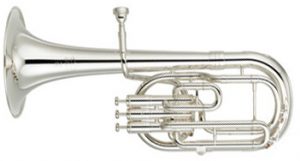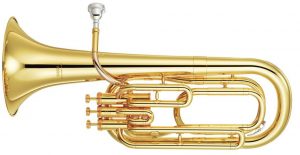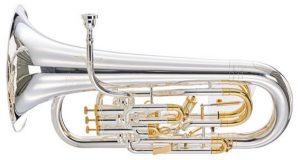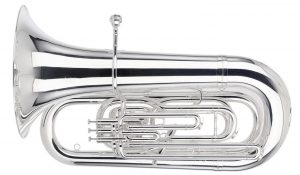Buying Your First Low Brass Instrument
Showing all 3 resultsSorted by price: low to high
Buying your First Low Brass Instrument
This little guide to buying your first low brass instrument will help you get started as you begin your journey. Tenor horns, baritone horns euphoniums, tubas: there is plenty consider that what is written here – please contact us for expanded advice!
Read: our in-depth guide to the brass instrument family
A list of new (and sometimes second-hand) low brass instruments for beginners can be found below.
Different Types of Low Brass
Alto / Tenor Horn

This is the same thing! In British English, the instrument is called a tenor horn. In American English, the instrument is called an alto horn. Why? Who knows. But we are going to call it a tenor horn.
The tenor horn is almost exclusively found in brass bands. It is pitched in E♭ and serves as a bridging voice within the brass world. It supports cornets and flugels with its mellow sound and provides tones that tubas and baritones are unable to reach. The warm tone produced by the tenor horn is not usually prominent enough for solos, but it does amazing work as a support instrument to create richness within a brass band.
Baritone Horn

The baritone’s bore is more conical than the tenor horn, and its mouthpiece is more like that of a trombone or a euphonium. It is pitched in B♭ and has similar characteristics to a trombone – sometimes even playing trombone parts. Once again, the baritone is almost exclusively found in brass bands. It produces a sound that is slightly mellower than a trombone, but arguably brighter than a Euphonium.
Euphonium

Euphoniums and baritone horns are almost the same thing. The amount of tubing is the same for both, and both are in B♭. However, a Euphonium’s bore size is typically larger and more conical. Sometimes a euphonium will have a fourth valve, but not always.
Tuba

You will need a lot of air to play a tuba, which is why younger players will generally start on something smaller like the euphonium or baritone horn. Tubas are so well known that they have broken away from the obscurity of their slightly smaller cousins and have proven to be surprisingly versatile instruments. They can be found in orchestras, brass bands, big bands, pop music, and plenty more.
New, Second-hand, or Rental?
There are two main concerns when it comes to the condition of a low brass instrument:
- Issues with the build quality at the manufacturing level
- Issues with how the instrument has been treated over the years
New Horns
Unlike woodwinds, most brass instruments are in fairly good playing condition when they first arrive from the factory. Most well-known manufacturers are consistently good, e.g. Besson and Yamaha.
In saying that, buying from a repair workshop like Vanguard is a smart idea! A workshop is able to check over a new instrument; it will ensure the valves are operating smoothly and the slides are sliding.
Important: if you want to enjoy playing your instrument, do not buy one with a brand name you have never heard of. These instruments are expensive because of the material used and the difficultly to construct them. In saying that, the ‘John Packer’ brand seems outrageously cheap ($2,799 for a tuba on TradeMe as of this writing) but produces frustratingly competent instruments. How can they be sold so cheap? My guess would be ethically dubious production facilities.
Second-Hand Horns
Tread carefully in the minefield that is the second-hand brass instrument market. As well as the potential issues remaining from the manufacturer, an old horn might have been neglected. We clean a lot of tubas at Vanguard. Sometimes I struggle not to dry retch as clotted green jelly oozes from the leadipe.
If your budget only allows for a second-hand instrument, please consider the following:
- Buy a brand that you have heard of
‘Yamaha’ or ‘Besson’ are brands you have heard of. ‘Mirage’ or other names related to visual trickery are not brands you have heard of. Google if unsure.
- Check the horn first
Bring your potential horn into a workshop (e.g. Vanguard Orchestral) to get it checked if possible. It is not fun buying a $200 Conn from somebody’s grandad and then learning that it needs $2000 worth of work to play.
- Buy from a workshop
Some workshops (including us) sell instruments on behalf for people. These will generally be in good playing condition or will have the repair cost built into the price.
Renting
Renting is a great, affordable way to start playing the trombone. It can let a new player know if they want to pursue something without committing to buying.
Rental instruments have usually been around the block a few times and may not be in the greatest condition. Your rental shop should keep their instruments serviced to a reasonable standard. If in doubt, bring the instrument into a workshop to get it checked over.
A bad horn can discourage a player. A good one can give a player years of joy!
We have several good student-level low brass instruments available for the beginner:



